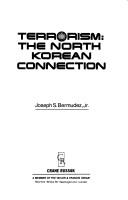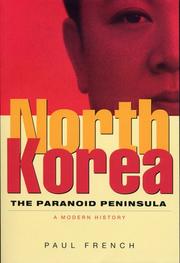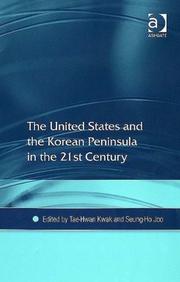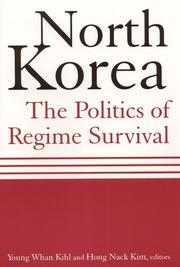| Listing 1 - 10 of 39 | << page >> |
Sort by
|

ISBN: 0844816108 Year: 1990 Publisher: New York Crane Russak
Abstract | Keywords | Export | Availability | Bookmark
 Loading...
Loading...Choose an application
- Reference Manager
- EndNote
- RefWorks (Direct export to RefWorks)
Book
ISBN: 9780367198145 9780429260797 0429260792 9780429551086 0429551088 9780429536380 0429536380 9780429522918 0429522916 9781315769462 1315769468 0367198142 9780415750394 0415750393 Year: 2020 Publisher: London Routledge
Abstract | Keywords | Export | Availability | Bookmark
 Loading...
Loading...Choose an application
- Reference Manager
- EndNote
- RefWorks (Direct export to RefWorks)
"This book analyses North Korea's foreign policy towards the United States during the Kim Jong Il era. Throughout these years, North Korea sought but failed to normalise diplomatic relations with the United States. Making use of theories of bargaining and learning in International Relations, the book explains how the inability of the Kim Jong Il government to correctly understand domestic politics in Washington and developments in East Asian international relations contributed to this failure. As a result, Pyongyang accelerated development of nuclear weapons programme with the aim of strengthening its negotiating position with the US. However, towards the end of the Kim Jong Il government it became unclear whether North Korea is willing to reverse its nuclear programme in exchange for normal diplomatic relations with the United States. The book includes material from over 60 interviews with American, Chinese, Japanese, Korean and Russian policy-makers and experts who have dealt with North Korea. It also analyses in detail Pyongyang's official media articles published during the Kim Jong Il era.This work will be of great interest to students and scholars of US Foreign Policy, Korean Politics and International Relations alike"--
USA--FOREIGN RELATIONS--KOREA (NORTH) --- KOREA (NORTH)--FOREIGN RELATIONS--USA --- KOREA (NORTH)--FOREIGN RELATIONS --- Kim, Chŏng-il, - 1942-2011 --- United States - Foreign relations - Korea (North) --- Korea (North) - Foreign relations - United States --- Korea (North) - Foreign relations --- United States --- Korea (North)
Book
ISBN: 9780231153225 Year: 2010 Publisher: New York : Columbia University Press,
Abstract | Keywords | Export | Availability | Bookmark
 Loading...
Loading...Choose an application
- Reference Manager
- EndNote
- RefWorks (Direct export to RefWorks)

ISBN: 1842774735 Year: 2005 Publisher: London : Zed Books,
Abstract | Keywords | Export | Availability | Bookmark
 Loading...
Loading...Choose an application
- Reference Manager
- EndNote
- RefWorks (Direct export to RefWorks)
Book
ISBN: 9781498566254 Year: 2018 Publisher: Lanham, MD : Lexington Books,
Abstract | Keywords | Export | Availability | Bookmark
 Loading...
Loading...Choose an application
- Reference Manager
- EndNote
- RefWorks (Direct export to RefWorks)
How and why are the Kims rational ? There is no consensus about either the Kims' rationality or how best to determine if they are rational actors. This book offers a concise and finite method to assess rationality by examining over ten cases of provocations from the Korean War to the 2015 land mine incident. The author asserts that Kim II-sung was predominantly a rational actor, though the regime behaved irrationally at times under his rule, and that both Kim Jong-Il and Kim Jong-un have clearly been rational actors. As a rational actor, Kim Jong-un is unlikely to give up his nuclear weapons. This book argues that Kim can be deterred from using them if the United States demonstrates its willingness to coexist with his regime and pursues long-term engagement to reduce Kim's concern that North Korea's sovereignty needs defending from U.S. hostile policy. This could allow gradual social change within the country that could eventually lead to positive systemic change as well as soften Kim's rule. In this regard, time may be on the side of the U.S.-South Korean alliance, but the two allies must embrace the long view and learn to be more patient or risk another conflict on the Korean Peninsula.
Book
ISBN: 9781793608208 Year: 2021 Publisher: Lanham, MD : Lexington Books,
Abstract | Keywords | Export | Availability | Bookmark
 Loading...
Loading...Choose an application
- Reference Manager
- EndNote
- RefWorks (Direct export to RefWorks)
The author contends here that Kim Jong-un's consolidation of power at home and the leveraging of Beijing, Moscow, Seoul, Washington, and others abroad show that he is not a madman and has consistently been underestimated.

ISBN: 0754648133 Year: 2006 Publisher: Aldershot, UK : Ashgate,
Abstract | Keywords | Export | Availability | Bookmark
 Loading...
Loading...Choose an application
- Reference Manager
- EndNote
- RefWorks (Direct export to RefWorks)
Book
Year: 1978 Publisher: London : Institute for the Study of Conflict,
Abstract | Keywords | Export | Availability | Bookmark
 Loading...
Loading...Choose an application
- Reference Manager
- EndNote
- RefWorks (Direct export to RefWorks)

ISBN: 0765616386 Year: 2006 Publisher: Armonk, NY : Sharpe,
Abstract | Keywords | Export | Availability | Bookmark
 Loading...
Loading...Choose an application
- Reference Manager
- EndNote
- RefWorks (Direct export to RefWorks)
Book
Abstract | Keywords | Export | Availability | Bookmark
 Loading...
Loading...Choose an application
- Reference Manager
- EndNote
- RefWorks (Direct export to RefWorks)
| Listing 1 - 10 of 39 | << page >> |
Sort by
|

 Search
Search Feedback
Feedback About UniCat
About UniCat  Help
Help News
News